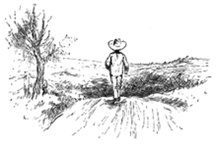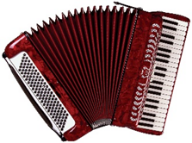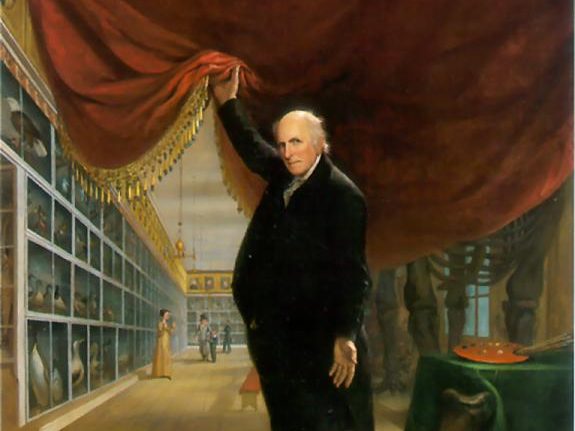In his old age, an American painter invited the public to view his work. In 1822, using the social media of his time, Charles Willson Peale (1741-1827) painted his self-portrait in his “cabinet of curiosities,” housed in Independence Hall, Philadelphia, where the Declaration of Independence had been signed 46 years earlier. As with the opening of a play, Peale holds a curtain up to display the familiar and the strange from his lifetime of learning.
Image credit: Charles Willson Peale, “The Artist in His Museum” (1822; Joseph Harrison, Jr. Collection, Pennsylvania Academy of Fine Arts).
Like Peale, this page invites you to peek behind the curtain about what makes America tick. Bring your curiosity and your questions, your enthusiasm for American ways and your critiques. Click on the triangles below to get start browsing…
Your Host, Paul Croce
Historian, Culture Watcher, and Curator of the Public Classroom
Stories from the past can turn disagreements from obstacles into opportunities
This webpage displays some of the curiosities of modern culture and politics. As a historian, I have dedicated my career to scouting for little-known stories and presenting new dimensions about familiar parts of life—in other words, making the strange familiar and the familiar strange in our often-troubling world.
As I reach toward the end of my own career teaching and writing about historical trends, especially in the United States, I now bring these parts of my vocation together, with academic insights presented briefly for the public classroom.
I was going to call this page The Public Classroom. My son saw these words and suggested something briefer and funner (and yes, that is a funner word!): “How about PubClassroom,” Peter asked? Thanks to him, we have a briefer name for these brief commentaries designed to shed light on recent events.
I have been teaching American history at Stetson University, in DeLand, Florida, since the late 1980s, and I’ve written two books and over a hundred scholarly articles, chapters, and reviews; read all about it here.
PubClassroom.com is a free public service. In developing this page, I have been able to give back to the people and contexts that helped me become a professor, a job that’s allowed me to be paid to learn.
The thinking for this webpage began when I didn’t know much about American culture but assumed a lot. On leaving the country at age 20, I stopped taking American culture for granted. As an undergraduate exchange student in Britain, I met America again for the first time. On looking back to my native turf, I thought … The US is a place with a lot of power and influence, and with a lot of puzzlements; I want to learn more….
After earning my undergrad degree, cum laude, in Political Theory and History from Georgetown University, and my Ph.D. in American Civilization from Brown University, the miracle of the academic marketplace landed me in the American Studies Program of this small college dedicated to general education, really the kind of learning I aim for on this webpage but now not just for college-age students but for the public beyond college walls.
My own children have also contributed to the development of this webpage—and not just with its name. To my impulses for elaboration in detail, the puzzled looks of Peter and Elizabeth provided valuable lessons in concision, and their warnings about too much “complexifying” encouraged clarity.
My own deep academic dives have focused on science, religion, and William James (1842-1910), the founder of American psychology, popularizer and refiner of pragmatic philosophizing, keen observer and theorist of religious experiences, and advocate for the power of public discussions to address shortcomings in social justice. James offers continuing wisdom for our time in moving beyond both pessimism (that’s suggested by a lot of bleak facts) and optimism (blooming from idealistic visions) in favor of what he calls meliorism. Because “The world…is what we make of it,” how can we improve or ameliorate the conditions around us? No one of us can wholly solve problems on our own, but can we make our settings better? As my father would say, Leave things a little better than the way you found them.
I am particularly dedicated to learning from contrasting opinions, ideologies, philosophies, and belief, and that is a central theme in a lot of my writing. In our angry times, that’s swimming upstream—there’s a lot of fighting these days! Reason to stop trying to listen across differences? Fuhgeddaboudit! These fraught times present an opportunity. I perceive that the anger and the fighting can only satisfy in the short term; more enduring progress comes with learning across disagreements. James serves as a good example. His writings offer suggestions for building bridges in our time between academia and the public—and across our polarized divides.

James provides a model for a lot of my work, and I’ve done my homework on him. I have served as President of the William James Society, with Harvard’s Houghton Library I organized a symposium on the centennial of his death, “In the Footsteps of William James,” and I’ve written Science and Religion in the Era of William James: Eclipse of Certainty, 1820-1880 (University of North Carolina Press, 1995); and Young William James Thinking (Johns Hopkins University Press, 2018). A central finding of my research is that James turned his youthful troubles and indecisions into opportunities to learn and to remain open to contrasting perspectives, which shaped his contributions to many fields.
Those opportunities to learn about the contexts driving different perspectives and about the resulting ideologies—the good, the bad, and the works in progress—have motivated my approaches to teaching in the academic classroom and now also for the public classroom. Visit more of PubClassoom.com to find stories about American culture that can add new twists for your understanding of life in these United States, how we’ve gotten to our present setting and how to prepare for what’s next.
And now, see the 2nd triangle, ➤About the Public Classroom, on learning enough to form your own solid judgments.
About the Public Classroom…
With a Goldilocks Approach: Not Too Long, Not Too Short
TLDR. It’s a social media phenom meaning “Too Long Didn’t Read.” Unfortunately, that also means settling for TSTU—Too Short To Understand. This site aims for writing that explains some contexts on many issues, but that’s brief enough not to require expertise to figure out.
Resisting reading that is too long is understandable. Life gets busy and long texts are often inaccessible. But actually, that leaves a lot of missed opportunities for learning that can seize a solid place between ignorance and expertise.
Plus, thinking only with the stuff of sound bites lends itself to outrage about any view different from one’s own. Here is a ground zero of our polarizations. And there are plenty of smart people who readily produce the clips designed to stoke that outrage. Even the TL;DR with proper punctuation—Too Long; Didn’t Read—still leaves your brain rented out to other people rather than stocking it to enable thinking for yourself.
The Public Classroom is a platform with brief essays providing readers enough explanations to form their own judgments. Imagine learning essential traits of issues, including contrasting views, with more detail available at a library, in a book, or on a web page near you.

Without advocacy or ideological spin, these essays provide contexts from the arc of the past to enable readers to make up their own minds. We cannot know what’s next, but we can all learn more about the factors that have brought us to the present and that will serve as the secret sauce of the future.
PubClassroom supplies the ingredients; you cook up your own views.
On PubClassroom.com, I’m bringing college learning out from under the bushel basket of scholarly expertise for exchanging insights and inviting debate. How can historical research shed light on contemporary challenges? Absolute answers are not likely, but how about some perspective, some contexts, some stories of past troubles dealt with—or not—how can these give some sound footing for figuring out next steps?
Photo Credit: Mark Twain, The Adventures of Huckleberry Finn (1885), and see the essay, “Challenging His Teacher’s Racism: Was Huck William James?” PubClassroom, December 31, 2017

Like Huck Finn toward the end of his Mississippi River journey, this web page, constructed toward the end of my scholarly career, lights out on the strand of frontier territory between academic abundance and public interest. Also like Huck, if I have “done wrong” by the lights of any outlook or ideology, the fault may be with me. But before dismissing these PubClassroom outposts, consider the goal, to get past the impulses of the fighting parties for “finding fault” with the other side, and go forth to do THIS frontier job better, starting with listening even when in disagreement.
Welcome to this webpage, the public classroom for useable ideas linking academic thinking to public purposes.
While my research on William James and other thinkers has provided wise general guidance, the content of the essays on PubClassroom.com comes from my teaching on a range of topics in American history. With heady theory serving as general inspiration but slipping to the back of my mind, I have taught courses on topics that confront deep values differences—you know, issues that manners experts tell you not to bring up at the dinner table! But the learning in these courses, on environmental debates, the American Civil War, medical controversies, political polarization, media and the public sphere, race relations, science and religion, war and peace, and the 1950s and 1960s, gets better when we don’t shy away from disagreements, but use the different points of view as learning opportunities. Then, instead of learning what we already know, we can learn whole new worlds, near and yet so far, hidden in the minds and hearts of the people right around us.
Teaching has even given ideas for Public Classroom essays. I’ve noticed “hooks” between items in the news and stories from history. For example, in the early 1990s, when first teaching about the 1960s, I noticed some parallels between the irreverent style of the counterculture Yippies and the tendency for businesses to associate their products with the same type of free-spirited defiance of authority. That insight, which first emerged when teaching about the legacy of the 1960s, spurred an essay, “From Abbie Hoffman in the ‘60s to Joe Isuzu in the ‘80s,” comparing Hoffman, who wrote a book called “Steal This Book” to ridicule the world of marketing, and the car company’s pitchman sporting a big grin while openly declaring, “I’m lying” about just how super the car was.
This little story shows how businesses borrowed the irreverence of that radical time to ridicule any questioning about buying consumer goods—like that car.
PubClassroom.com is dedicated to sharing the goals of general education, which encourages connections across cultural trends and versatilist thinking. With mental flexibility, you can bring awareness about a range of fields and versatility to a changing and challenging world. Here available for all interested citizens—without the tuition!

If you disagree with something on this web page—even in this opening statement—let’s hear it! As in the college classroom, so in the public classroom, I approach disagreements with a Pat Benatar Approach to Disagreements, based on her song, “Hit Me With Your Best Shot.” On hearing sharply different values or ideologies in class, I insist, hit us with your best shot, Fire Away!
We may still disagree, but we can learn from each other. Head to Ask the Prof, and fire away.
Welcome to PubClassroom.com, the classroom without walls for looking past—and through—our walls of disagreement!
Turn to the 3rd triangle, ➤ Why the Public Classroom, about my dream of translating complicated insights into useable understanding.
Why Pub Classroom?
Dreaming in Translation
The work of universities is like a gallery of paintings—elaborate and rich in detail. Yet the whole gallery is not always needed. PubClassroom provides sketches of those robust scenes, with academic work translated into briefer, useable forms.
Why the Public Classroom?
Because academics harbor a lot of learning, but all that knowledge and insight often remains unused in the public. As with Las Vegas, what’s learned in colleges and universities often stays there. No wonder. Most people are busy with their own lives and work, so it would be hard to follow scholarly publications or attend college classes.
Another reason for this disconnect of “town and gown” is that academics often speak with more intricacy and complexity than most people need to steer through key issues. Universal expertise is not here the point. But some academic insights could be a great leaven for most of us wrestling with big public issues. And that understanding could blunt some of the polarization that pervades current politics.
Intricacy of knowledge and complexity of understanding are good things; they provide abundance of facts and rich nuances of insight. In fact, our colleges and universities are treasure houses of learned women and men, with great scholarly resources in journals and books that can address virtually every issue on the planet. And yet, the greater the learning, the less those insights are used because hidden by complexity.
In the modern USA, as in other mass democracies, these restrictions have not emerged by political censorship or police tactics, but as unintended side effects of our great academic achievements. A funny thing happened on the way to building enormous scholarly expertise: few people read those works. Surely, there is a goodly number of intrepid public intellectuals writing clear texts about sophisticated topics, and media outlets do bring on academic experts for brief learned commentaries on pressing issues of the day. But less nuance often comes with more advocacy of particular points of view. Beyond these few connections to higher learning, academic work and its ability to provide broad contexts is generally hidden away from public life, and students arrive in college classes already primed with these attitudes, ready to treat courses in the humanities and social thought as obtuse barriers to “get out of the way” on their paths to practical training.
This dream of the public classroom does not mean that these academic insights are always right—far from it. Perfection is not the point, and this page offers no support for any smug scholarly claim to superiority. The point is that more access to academic knowledge and insight offers fighting chances for improvements through the power of increased understanding about contexts, implications, and prospects—in other words, about our past, our present, and our future. These fruits of academic insight can help to identify The Three Whats of every problem: What Happened, So What, and Now What?
This understanding will not always solve problems, but it gives resources to the imagination for thinking outside the box of current assumptions. This understanding can stock the mind with clues for addressing those issues while supplying the heart with sympathy for different points of view. And this understanding can stoke the will toward greater motivation to carry on despite discouragements. And yet, even those modest steps are not generally available to the public because academic discourse can be very difficult to follow….
Discourse…. There, I said a favorite academic word but one that often turns off other citizens. It’s a fancy way of talking about communication, or more plainly, discourse means talk—even as it suggests talk with more formality and earnestness than in the usual string of words most of us bandy about. Can we find ways toward wider mining of the resources of university insights even with its discourse, but expressed more plainly? Yeah, that’s what I’m talking about!
This perspective honors the spirit of Michael Bérubé but in reverse for our time and our current issues. While he presented a “few clear words” to encourage more acceptance of scholarly “obscurity” for its capacity to “disrupt, not simplify,” the essays here seek to translate the treasure troves of fertile but complicated scholarship to foster more understanding with delivery of fewer and clearer words than those that inhabit most scholarly discourses. For some, those will serve as “starter drugs” for digging into the more obscure texts themselves, even as for more, the briefs will be sufficient for clarifying their worlds.
So, can we talk? Scholarly intricacy and complexity are good, even vital, but they are not always needed, not all the time. My dream is like an accordion, with some expressions of scholarly information and academic acumen pulled wide for expansive coverage, but at other times pushed in for briefer coverage, with ideas clearer and more accessible to non-experts.

In this dream, as complicated issues arise, citizens confronting problems would play the notes they need based on their preparation so far in order to track down enough information and insights to address problems. For scholars who worry that non-experts will select poorly or misinterpret their work, these entries to academic insight are better than widespread ignoring—call this the path of bridges rather than walls. And those bridges can serve as paths for further learning.
The worlds of academia and of the public for the most part completely ignore each other—walls around each neighborhood, few bridges—and yet, they could benefit from each other. Academics could benefit from understanding what issues leave citizens curious or confused; this can suggest topics for research. And with translated parts of scholarship meeting citizens where they are, more readers can benefit from the insights. And briefer renditions of profound scholarly knowledge and insight could serve as introductions to its more intricate varieties. More readers, more spread of insights. More complicated problems addressed, more people recruited to address them.
Dear reader: Read on…. And dear academic: Write on, watching for those possibilities…. These worlds have veered apart, but academia and the public can meet each other again … to learn from each other, find compelling stories, and take on more challenges.
But then I wake from the dream to our current situation. Much public discussion is based less on learning than on fighting, with eagerness not to figure things out, but to show how all those others are all wrong.
Increased polarization has made public discussion a Mutual Denigration Society. “Talk Shows” are often about fighting. Tweak the name of one of the most venerable talk shows, “Meet the Press,” and you could get to a fair description of “Press the Meat” shows with “raw meat” to stoke our fighting spirits.

As the biblical book Ecclesiastes points out, there is a time for conflict; there is also a time for listening and for constructive criticism. After all, when the shouting stops, those problems are still there.
In the shouting arenas, the treasure house of scholarly insights is not only unavailable. It is generally not even recognized. The appearance of professors in public discourse often reminds citizens of the complications of that discourse, of that fancy talk. All those insights are at best unused, and often just ridiculed. Most citizens face an awkward if not impossible choice: stay in the public arena of incessant outrage or just tune out the noise. Neither path does much to address problems.
Fortunately, those are not the only choices. My dream is for bridges between public curiosity and academic thinking. Each side needs to step up. It’s takes two to tango, as my father would say.
Hey Citizen Readers! This goal calls for holding on to your curiosity in the midst of fear and anger about our many problems. Then there’s no need to drop those fiery emotions. They are vitally important. They are beaming searchlights pointing to what’s important to you. And you are a resident expert on your own vision of the world and the issues you’ve selected to understand life and cope with its challenges. But no matter how fired up about problems, or by contrast no matter how much you ignore problems, they keep on despite us.
Respect for each person is a vital first step toward then recruiting them to address those problems using the resources of their vision, as long as the respect is mutual for each of those respective resident experts on their sector of the world. Looking at the range of views in this way presents opportunities to put diverse people to work on the diverse problems we face. Got a problem that is worth fighting about? OK, that also means it’s a problem that itself needs fighting with all the energy of that fighting spirit.
Turning to academia, this dream is built on the translation of academic thinking in clearer ways than are usually presented in academic journals. This webpage takes a step toward stories and essays with knowledge and insights drawn from my own fields in academia, expressed in briefer and more accessible ways than in the complex language of most scholarly discourse (including some of my own).
This dream is the work of The Public Classroom: to open the windows of academic thinking by translating its rich work into briefer and clearer form and to use those insights to turn hostile positions in conflict into resources for addressing problems.
See the Essays Hub on PubClassroom.com for the essays posted so far. Watch for more brief essays using academic insights to address public questions. Read on—and turn to Ask the Prof to add your suggested topics for the next essays.

